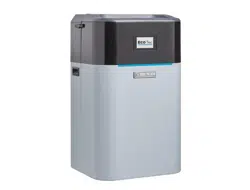Loading ...
Loading ...
Loading ...

Part number 550-100-260/0520
58
ECO
®
Tec
GAS-FIRED WATER BOILER – 80/110/150/199 BOILER MANUAL
—
For your safety, turn off electrical power
supply at service entrance panel before
making any electrical connections to
avoid possible electric shock hazard.
Failure to do so can cause severe
personal injury or death.
Wiring must be NEC Class 1. If original wiring as
supplied with boiler must be replaced, use only type
105 °C wire or equivalent. Boiler must be electrically
grounded as required by National Electrical Code
ANSI/NFPA 70 – latest edition, and/or the Canadian
Electrical Code Part I, CSA C22.1, Electrical Code.
The installation must comply with:
National Electrical Code and any other
national, state, provincial or local codes
or regulations. In Canada, CSA C22.1
Canadian Electrical Code Part 1, and
any local codes.
The boiler when installed, must be electrically
bonded to ground in accordance with the
requirements of the authority having jurisdiction
or, in the absence of such requirements, with the
National Electrical Code, ANSI/NFPA 70 – latest
edition, and/or the Canadian Electrical Code Part I,
CSA C22.1, Electrical Code.
Boiler wiring
All low voltage field wiring is made
directly to the corresponding
terminal blocks on the circuit board.
Low voltage, 24VAC, terminals are on the right side and right
bottom of the circuit board.
Line voltage, pump, and /or AUX, 120VAC, terminal strips are
on the bottom of boiler inside the High voltage junction box.
Wiring overview
See details on the following pages for the wiring connections
outlined below:
circulator and outdoor temperature sensor (unless exempt
as described in this manual).
circulator, when required.
recommended for primary/secondary piping systems.
damper, flow switch, etc.); 0–10VDC for target or
modulation control; remote alarm; additional heat
demand contact; and communication cables for building
management system interface (MODBUS -sold separately).
see next page
Wire entrance knockouts are provided on the top right, the
bottom middle and the bottom right of the boiler cabinet:
1. Line voltage— five (5) knockouts on the bottom middle of
the cabinet (Line In, Output 1, 2, 3, 4).
Outputs 1&4 not
used for combi models
2. Low voltage— three (3) knockouts on the bottom right side of
the cabinet and 1 knockout on the top right, (Use one of these
knockouts for BMS communication wiring).
Installer MUST use a strain relief through jacket
knockouts. Failure to do so can cause severe personal
injury, death or substantial property damage.
Installer MUST SEAL all electrical entrances using
a sealed strain relief or a strain relief sealed with
duct seal putty or silicone. Sealing the entrances
prevents the boiler from drawing air from inside
the boiler room. This is particularly important if
the boiler is located in the same room as other gas
appliances. Failure to seal entrances could result in sever
personal injury, death or substantial property damage.
see next page
(120VAC in, circulator outputs)
1. Line voltage should be wired from the bottom middle electrical
entrances going into the High voltage junction box.
2. Strip end of wire no more than
1/4" to avoid exposing
uninsulated wire.
3. It is recommended to install an On/Off service switch in a
junction box mounted near the boiler. Installation must meet
all National and local electrical codes.
1. Mount low voltage wire grommet(s) to desired low voltage
knockout(s).
2. Thermostat, aquastat, limit devices, system sensors, 0-10VDC
input and outdoor temperature sensor wire pairs should be
routed through the grommet(s)/knockout(s).
3. Wires should be connected directly into the corresponding
terminal block.
Field wiring
Loading ...
Loading ...
Loading ...
